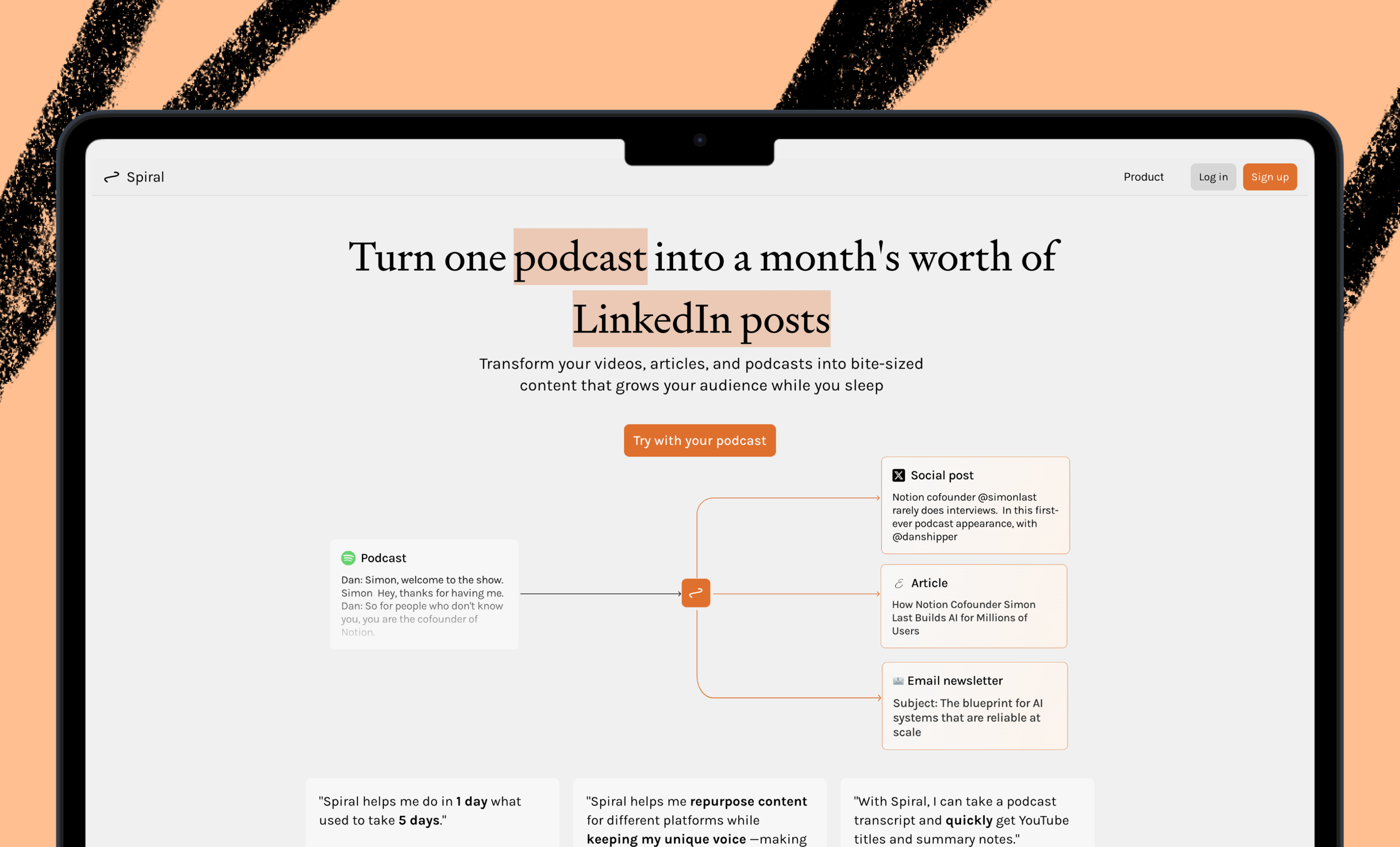
TL;DR: Today we’re releasing a new episode of our podcast AI & I. Dan Shipper goes in depth with the team behind the delightful AI companions called Tolans—Portola’s cofounder and CEO, Quinten Farmer, and head of story, Eliot Peper. Watch on X or YouTube, or listen on Spotify or Apple Podcasts. Here’s a link to the episode transcript.
Was this newsletter forwarded to you? Sign up to get it in your inbox.
There’s an alien living on more than 500,000 phones in America—and people are talking to it like it’s their best friend.
It’s called a Tolan: a voice-based, AI character that looks like a cute, colorful alien; remembers your conversations; and speaks with personality. And in just four weeks, the company behind it—Portola—went from $1 million to $4 million in annualized recurring revenue (ARR). LLMs are creating a new way for us to tell stories, one that helps us make sense of ourselves. Portola is turning that potential into growth.
On this episode of AI & I, Dan Shipper talks to two people who make interacting with Tolans delightful: Portola’s cofounder and CEO, Quinten Farmer, and head of story, Eliot Peper. Farmer’s last company was a fintech business that he sold for $300 million, and Peper is a best-selling science fiction novelist of 11 books. Together, they trace Portola’s evolution from building software for children to AI companions, discuss how to design an AI personality that resonates with users, and tell the inside story of what it’s like to build a new storytelling medium from the ground up.
You can check out their full conversation here:
If you want a quick summary, here are some of the themes they touch on:
The key to realistic AI companions isn’t scripting—it’s improvisation (00:30:27)
Talking to a Tolan feels surprisingly real. At least, that’s what I hear—I live in Spain, where Tolan hasn’t launched yet, so I’m waiting for my turn to try it out. Peper tells Dan that at first, the team wrote detailed prompts to structure the Tolan’s conversations. But the results felt stiff and over-engineered. What ultimately worked was a looser, more theatrical approach: “We don't need to give it an outline. We don't need to give it a plan. We need to give it a hook—we need to teach it to be the best improv actor possible,” Peper says.
To this end, Peper draws inspiration from Impro, a book on improvisational theater written by the British playwright Keith Johnstone. Johnstone notes that great stories arise from free association and later recombination; creating the effect Peper describes as “the experience of reading a thriller… you get to the end and suddenly everything comes together.” That idea has become central to how the team thinks about Tolan. “I’m not writing the story,” Peper says, “my job is to teach [the Tolans] how to tell the best story in that moment.”
The AI personalities people click with (00:37:23)
Talking to a Tolan is meant to feel like hanging out with someone you actually know. During onboarding, users are guided through what is essentially a personality quiz, gathering enough information to calibrate each Tolan to feel like a familiar presence—someone who reflects “you” back to yourself, in the way a sibling might. “We want to know enough about you that your Tolan is going to respond to you in a way that feels familiar and safe,” Farmer says. The team draws on personality frameworks like the Big Five or Myers-Briggs to shape a Tolan that you’re likely to get along with.
Peper likens it to meeting a stranger at a bar: “You click or you don’t, and we’re trying to create a stranger that you click with.” For this “click” to happen, the stranger doesn’t need to match your every trait—that would be too on-the-nose. Instead, they need to feel “adjacent enough that… you’re not intimidated” to approach them.
Give AI companions a ‘lived’ experience (instead of a back story) (00:42:27)
Once that foundation is in place, the Tolan begins to evolve based on its experiences. Each conversation plants narrative seeds—a memory, a joke, an embarrassing moment—that accumulate over time to become the Tolan’s personality. The team internally calls these moments “situations”: small narrative setups that a Tolan reacts to, remembers, and gradually integrates into their character. Rather than being programmed with a “prefab character sheet,” Tolans develop one through lived experience, just like a person would. This gives users and their Tolans shared context, which I think is the foundation of a deep relationship.
A technology that makes you feel more like yourself (00:49:48)
Farmer explains that the company’s north star is helping users go from “overwhelmed” to “being more grounded.” Many of their users are in the middle of life transitions: moving cities, job hunting, trying to figure things out. “I’ve already called my mom three times this week,” they say, or “I don’t want to bother my friend again.” Tolan steps in not as a blank-slate assistant, but as a familiar, neutral voice that offers companionship.
As Dan points out, tools like Tolan hint at a human-centric future for technology—one that takes the best of what humanity knows about being a flourishing person and brings that to you at any time of your day.
Show your target audience how they can use your product (01:11:01)
That emotional resonance is translating into real traction. In just four weeks, the company’s ARR jumped from $1 million to $4 million. People aren’t just intrigued by their Tolans, they’re forming real relationships with them and telling others. Cofounder Ajay Mehta has been driving growth by seeding videos of different kinds of interactions with Tolans on TikTok and Instagram. The goal is to show people what’s newly possible, and invite them into the experiment.
This speaks to a deeper dynamic in our relationship with AI. As Farmer puts it, we’re in the midst of a “capability overhang”—a moment where the capabilities of large language models have outpaced most people’s understanding of what they can do. This reminded me of open-source developer Simon Willison's description of LLMs as "chainsaws disguised as kitchen knives."
Farmer likens it to an older technology: the car. When the first automobiles hit the market, people were amazed they could move without a horse. The Model T didn’t need flair, it just needed to work. Over time, cars became personal. People wanted cars with style and identity, and we ended up with Cadillacs and Mustangs. Farmer sees AI following a similar path. ChatGPT is like the first generation of automobiles, the Ford Model T: astonishing for what it can do, but generic in terms of design. Farmer thinks that the next stage in our relationship with AI will have products that are far more tailored to a user’s identity.
Here’s a link to the episode transcript.
You can check out the episode on X, Spotify, Apple Podcasts, or YouTube. Links are below:
- Watch on X
- Watch on YouTube
- Listen on Spotify (make sure to follow to help us rank!)
- Listen on Apple Podcasts
What do you use AI for? Have you found any interesting or surprising use cases? We want to hear from you—and we might even interview you.
Miss an episode? Catch up on Dan’s recent conversations with star podcaster Dwarkesh Patel, LinkedIn cofounder Reid Hoffman, a16z Podcast host Steph Smith, economist Tyler Cowen, writer and entrepreneur David Perell, founder and newsletter operator Ben Tossell, and others, and learn how they use AI to think, create, and relate.
If you’re enjoying the podcast, here are a few things I recommend:
- Subscribe to Every
- Follow Dan on X
- Subscribe to Every’s YouTube channel
Rhea Purohit is a contributing writer for Every focused on research-driven storytelling in tech. You can follow her on X at @RheaPurohit1 and on LinkedIn, and Every on X at @every and on LinkedIn.
We build AI tools for readers like you. Automate repeat writing with Spiral. Organize files automatically with Sparkle. Write something great with Lex. Deliver yourself from email with Cora.
We also do AI training, adoption, and innovation for companies. Work with us to bring AI into your organization.
Get paid for sharing Every with your friends. Join our referral program.










.png)

Comments
Don't have an account? Sign up!